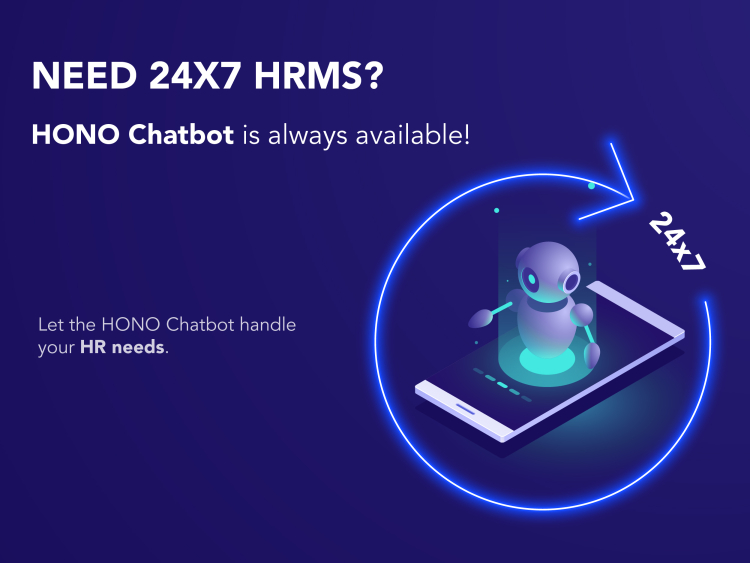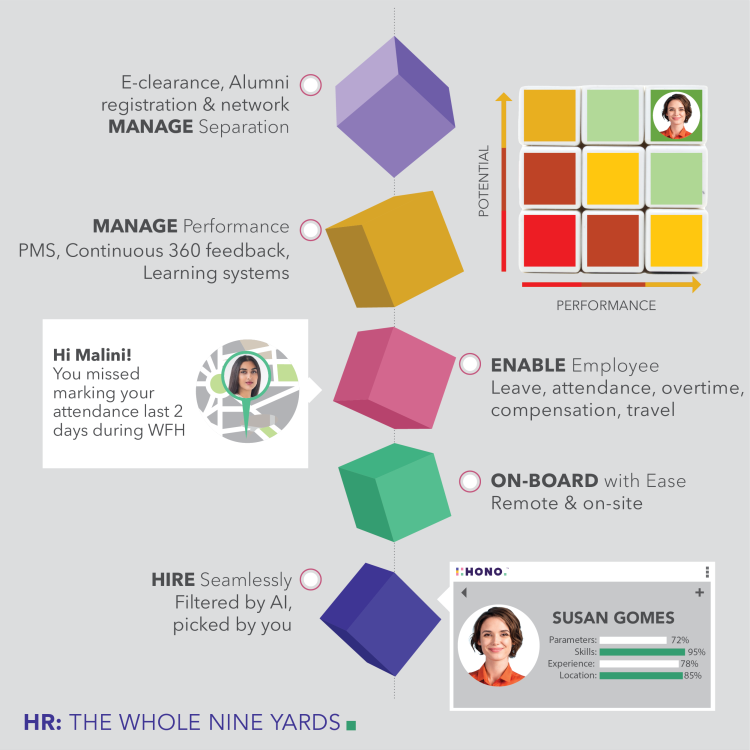Navigating HRIS, HRMS, and HCM: A Comparative Guide
As per the most recent report of imarcgroup, by 2028, the global HR market is expected to be worth $53.3 billion. Software for managing HR or HCM software has changed over time to become a powerful tool for B2B companies. From employee engagement to legal compliance, everything is streamlined.
However, when it comes to selecting the apt HR software, many organizations become confused between these three acronyms: HRIS, HCM, and HRMS. What do these terms mean? Which one is the most efficient?
In this blog, we'll talk about all three types so you can make an informed choice.
What is HRIS software?
HRIS is an acronym for Human Resource Information System, and it refers to the connected data management of multiple HR operations such as benefits, workforce management, payroll, and core HR. As HR departments took on new duties like talent acquisition and recruitment, they turned to HRIS software to assist them in keeping track of all the new policies and procedures they had to implement, as well as all the information on their employees.
The most advanced HRISs are interactive information management systems that standardize HR duties and processes while supporting accurate recordkeeping and reporting. The best HRIS and payroll software facilitates more efficient interactions between employees and their employers, allowing HR professionals to focus on more strategic, high-value tasks. Many people still use the term HRIS.
What is HRMS?
Human Resource Management System (HRMS) is a robust HR software that ensures the effective management of various HR operations through the use of modern technology.
HRMS software attempts to boost efficiency & productivity by minimizing repetitive operations. As a result, the HR team has more time to devote to more creative, business-critical activities that propel the organization forward.
Analysts used the word HRMS to designate HR software suites in the early 2000s when on-premises systems were the most common form of software. Advanced HRMS software features enabled HR professionals in managing a more modern workforce and putting information about a company's most precious assets in front of the people who require it, from employee data management to payroll, recruiting, benefits, training, talent management, employee engagement, and employee attendance.
Although the term HRMS is still used to describe systems that are now hosted in the cloud, it is less commonly used when referring to natively built cloud applications.
The finest online HRMS software covers numerous aspects of human resources, right from staffing strategy, recruitment, and onboarding to leave policy & transcription management.
What is HCM?
The term "human capital management" (HCM) or cloud HCM software is now commonly used to describe a cloud-based suite of HR applications aimed at enhancing the employee experience.
Human resource management (HCM) encompasses all HR activities, whether analytical, operational, or strategic. It converts the typical administrative functions of human resources departments—recruiting, training, payroll, compensation, and performance management—into opportunities to increase engagement, productivity, and business value.
Employee data is managed in a database using HCM software. Leading HCM cloud software companies use advanced analytics to assist organizations in determining the best method to manage their employees.
Cloud and software-as-a-service (SaaS) delivery options are increasingly becoming the new standard for HCM technology. The cloud method accelerates deployment, converts variable capital spending into fixed and transparent operational expenses, reduces IT costs, and increases agility by streamlining and simplifying upgrade pathways.
Also Read: 5 Ways HCM Software Can Transform Employee Experience
HRIS vs HRMS
The goals of both HRIS and HRMS are the same: to centralize and streamline access to HR data and processes through automation.
HRIS is a modest package of HR software. HRIS helps you get your business up and running quickly while taking care of the fundamental HR needs of any company. Human resource information systems (HRIS) are indispensable for any business that wants to keep track of its workers' schedules, salaries, vacation days, performance reviews, and other personal information.
Human resource management software, on the other hand, covers every angle of human resources management. Features like time, labor, and payroll are included in addition to those found in HRIS.
The HRIS features can be adjusted to meet the requirements of each individual region's employment laws and regulations. The HRMS suite makes it easy to deal with taxes and a number of other legal issues.
When comparing HRMS and HRIS, HRMS analytics clearly win out. When compared to HRIS, HRMS has a far higher number of available third-party App integrations.
Also Read: Explore the Top 5 Benefits of HR Software for Enhanced HR Management
HRMS Vs. HCM
Human resource management systems (HRMS) are designed to meet the needs of smaller and medium-sized businesses, while human capital management systems (HCM) can cover all stages of an employee's lifecycle in a large-sized business.
The online HRMS software performs beyond the typical HR duties, allowing businesses to be ready for any challenges or opportunities that may arise. It can spot the red flags and warn the HR department before it’s too late. Engagement, deployment, management, and retention of human resources are all significantly aided by HRMS.
Human capital management (HCM) can efficiently carry out all the features of HRM software. It can also be used for succession planning.
Which HR Software should you opt for your company?
HCM software covers a significantly bigger portfolio and delivers expansive features & functionalities in comparison to HRIS and HRMS. Human resource management software (HCM) includes talent management elements that help with management by optimizing the entire employee life cycle.
Some modern types of HCM software also come with the most up-to-date features such as performance management & learning, coupled with next-gen capabilities. Workforce management and optimization capabilities like employee engagement tools, pay, data analytics, and planning are also included.
Also Read: Performance Management System Selection Simplified: Your 4-Step Checklist
On-premises or cloud-based infrastructure can be used to set up human capital management software. The latter option is the more popular and preferable choice because it eliminates the infrastructure needed for maintaining the software. Also, provides benefits like quick scalability, easy software updates, etc. The ability to keep employee information secure is essential for any HCM software.
Select a full-suite hcm software built with security in mind, such as one that uses isolated network virtualization and immaculate physical host deployment to keep sensitive data safe from persistent threats.
Say goodbye to time-consuming tasks and embrace lightning-fast, simplified processes with the right AI-enabled HR software. Experience the Future: Discover the Power of Conversational AI with HONO’s Comprehensive HCM with Global Payroll. HONO’s "Chat First" Intelligent Conversational HRMS empowers users with seamless transactions on WhatsApp & MS Teams. With features like Intelligent Nudges, Predictive Analytics, and Autonomous Actions, revolutionize your HR processes and leave behind the hassle of app logins. Don't miss out on this game-changing solution that prioritizes convenience and efficiency in your HR operations. Schedule a demo.

Author:
HONO Desk
SUBSCRIBE NEWSLETTER
For HR innovation updates
Download free HR Case Studies







